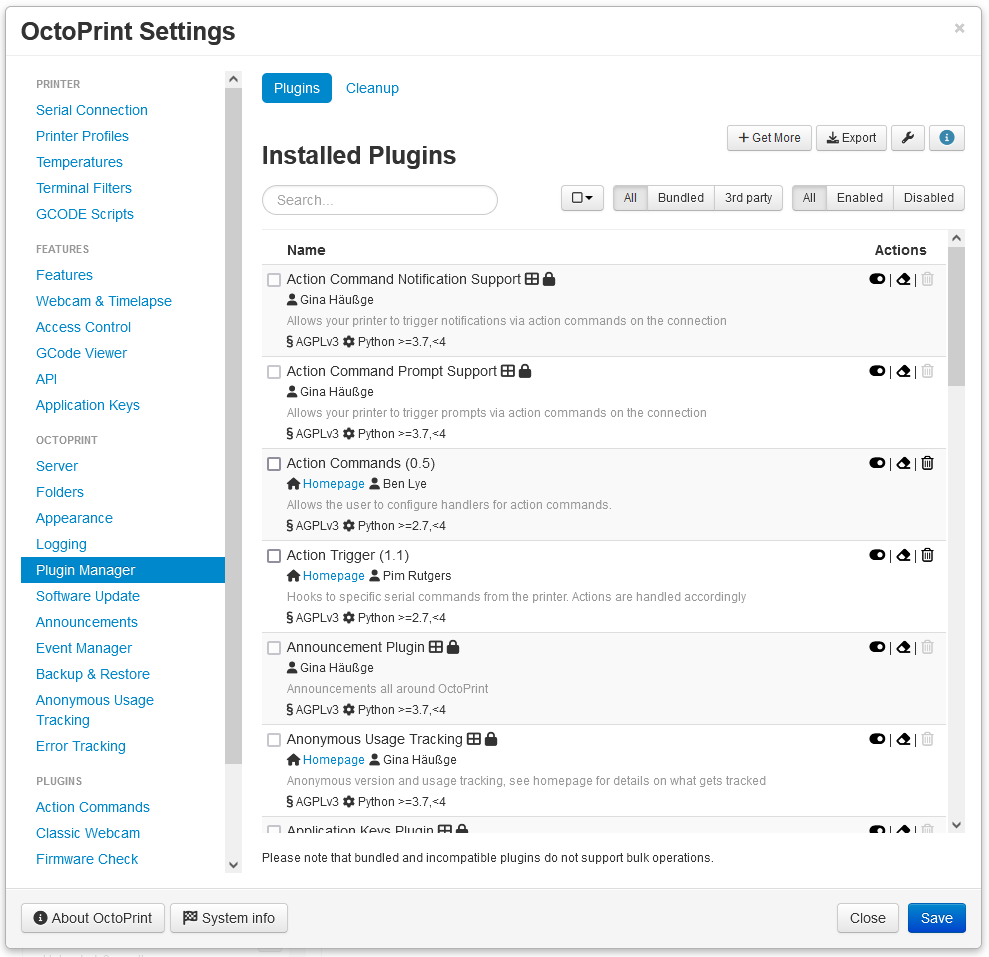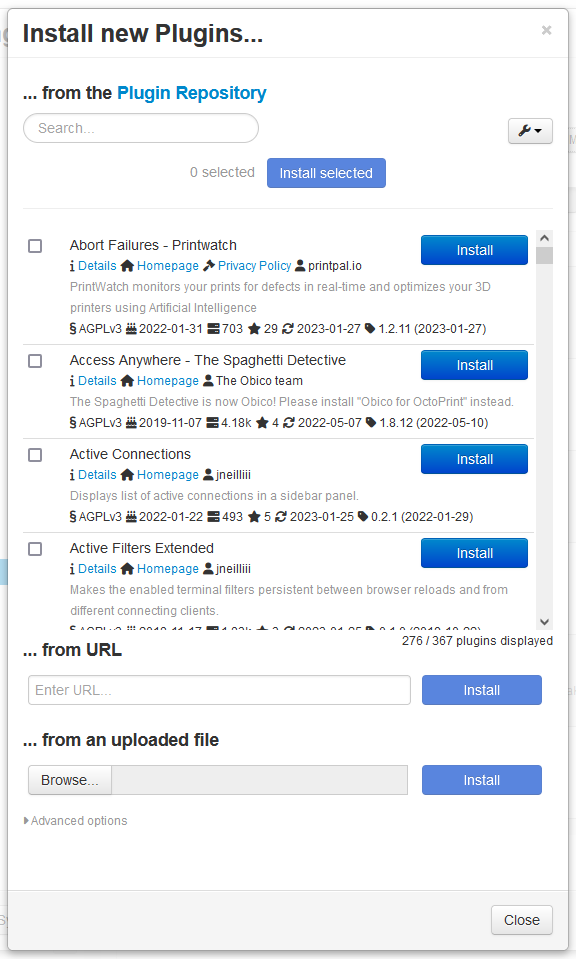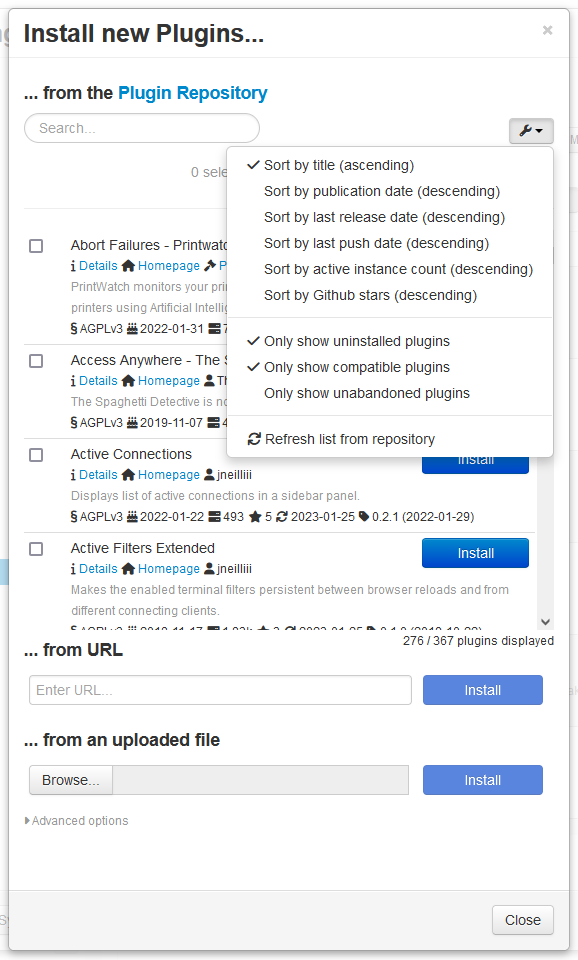Plugin Manager
New in version 1.2.0.
The OctoPrint Plugin Manager comes bundled with OctoPrint.
It allows management of installed plugins (listing, enabling, disabling and uninstalling) and installing new plugins from the official OctoPrint Plugin Repository, web addresses or uploaded files.
Installing from URL or file uploads currently supports the following file formats:
.zip,.tar.gz,.tgz,.tar,.gz,.whl: Will be considered to be plugin archive and installed viapip.
.py: Will be considered to be a single file plugin and installed by copying it into~/.octoprint/plugins.
.json: Will be considered to be either a plugin manager export file (created by the Export button) or a manually created list of URLs to install from, e.g.[ "https://github.com/jneilliii/OctoPrint-BedLevelVisualizer/archive/master.zip", "https://github.com/eyal0/OctoPrint-PrintTimeGenius/archive/master.zip" ]The plugin manager will feed all contained URLs to the same logic as above.

Fig. 18 The main dialog of the Plugin Manager

Fig. 19 Dialog for installing new plugins

Fig. 20 Filter options for the repository browser
Configuring the Plugin
The Plugin Manager plugin only has a handful of configuration settings which normally won’t have to be touched.
You can modify them either through the plugin’s configuration dialog that
you can open when clicking the little wrench icon in the upper right corner
under Settings > Plugin Manager, or by directly editing config.yaml:
plugins:
pluginmanager:
# The URL of the repository index to use
repository: http://plugins.octoprint.org/plugins.json
# Time to live for the repository cache
repository_ttl: 1440
# The URL of the plugin notices feed to use
notices: http://plugins.octoprint.org/notices.json
# Time to live for the notices feed cache
notices_ttl: 360
# Additional arguments to use with pip. Defaults to unset,
# you normally shouldn't need to modify this
pip_args: --some --additional --pip --arguments
# Whether to force the --user flag with pip. Defaults to
# false, you normally shouldn't need to modify this
pip_force_user: false
# Whether to have pip always follow dependency links.
# Defaults to false, you normally shouldn't need to
# modify this
dependency_links: false
# List of plugin identifiers hidden from the plugin
# manager. Defaults to an empty list. Not available
# through the configuration dialog, only available
# to allow for vendor customization
hidden:
- some
- hidden
- plugins
Events
- plugin_pluginmanager_install_plugin
A plugin was installed.
Payload:
id: the identifier of the installed pluginversion: the version of the installed pluginsource: source from which the plugin was installed, can be an URL or a path in the local file systemsource_type: type of source from which the plugin was installed, can beurlorpath
- plugin_pluginmanager_uninstall_plugin
A plugin was uninstalled.
Payload:
id: the identifier of the uninstalled pluginversion: the version of the uninstalled plugin
- plugin_pluginmanager_enable_plugin
A plugin was enabled.
Payload:
id: the identifier of the enabled pluginversion: the version of the enabled plugin
- plugin_pluginmanager_disabled_plugin
A plugin was disabled.
Payload:
id: the identifier of the disabled pluginversion: the version of the disabled plugin
Hooks
octoprint.plugin.pluginmanager.reconnect_hooks
- reconnect_hooks_hook(*args, **kwargs)
Returns additional hooks defined by the plugin for which the plugin manager should display the “You should reconnect to your printer” message on plugin install/uninstall/enabling/disabling.
Handlers should return a Python list containing the affected hook names.
Example
def reconnect_hooks_hook(*args, **kwargs): return ["octoprint.plugin.exampleplugin.some_custom_hook", "octoprint.plugin.exampleplugin.some_other_custom_hook"] __plugin_hooks__ = { "octoprint.plugin.pluginmanager.reconnect_hooks": reconnect_hooks_hook }
Source Code
The source of the Plugin Manager is bundled with OctoPrint and can be found in its source repository under src/octoprint/plugins/pluginmanager.